Introduction
Navigating the complexities of menopause can be a daunting journey, especially when it comes to managing body changes such as the notorious "menopot." As hormonal fluctuations take center stage, women often find themselves grappling with unexpected weight gain and the associated health risks.
Understanding the underlying causes of menopausal belly fat is essential for HR Benefits Managers who aim to support their teams in making informed lifestyle choices during this pivotal life stage. By implementing effective strategies—from balanced nutrition to stress management—organizations can foster a culture of well-being that empowers women to reclaim their health and vitality.
This article delves into the multifaceted nature of menopausal weight gain and offers actionable insights to help teams thrive during this transformative period.
Understanding the Menopot: What Causes Menopausal Belly Fat?
Menopausal belly fat, often referred to as 'menopot,' primarily arises from hormonal fluctuations that occur during menopause. As estrogen levels decrease, women experience a significant shift in fat distribution, with an increased tendency for fat to accumulate in the abdominal area, leading to greater visceral fat. This phenomenon, which includes menopot belly, is not just a cosmetic concern; it is linked to various health risks.
Additionally, age-related metabolic slowdown, lifestyle changes, and heightened stress levels further complicate management of body mass during this critical transition. Research from the Women's Health Initiative highlights the challenges encountered by postmenopausal individuals, revealing their tendency to regain mass after loss interventions, with an average mass regain of 2.5 ± 3.3 kg. This highlights the complex interplay between hormonal changes and weight gain.
Samar El Khoudary, an associate professor of epidemiology at Pitt Public Health, emphasizes the importance of early identification, stating,
If you can identify women at risk, you can help them modify their lifestyle and diet early to hopefully lower that risk.
Furthermore, the National Institute for Health and Clinical Excellence published clinical guidelines on obesity management, which can provide HR Benefits Managers with recommended practices to help their teams manage wellness effectively during menopause. By understanding these underlying causes and the related statistics, HR Benefits Managers can empower their teams to take informed steps toward managing their well-being, including concerns such as menopot belly during this transition.
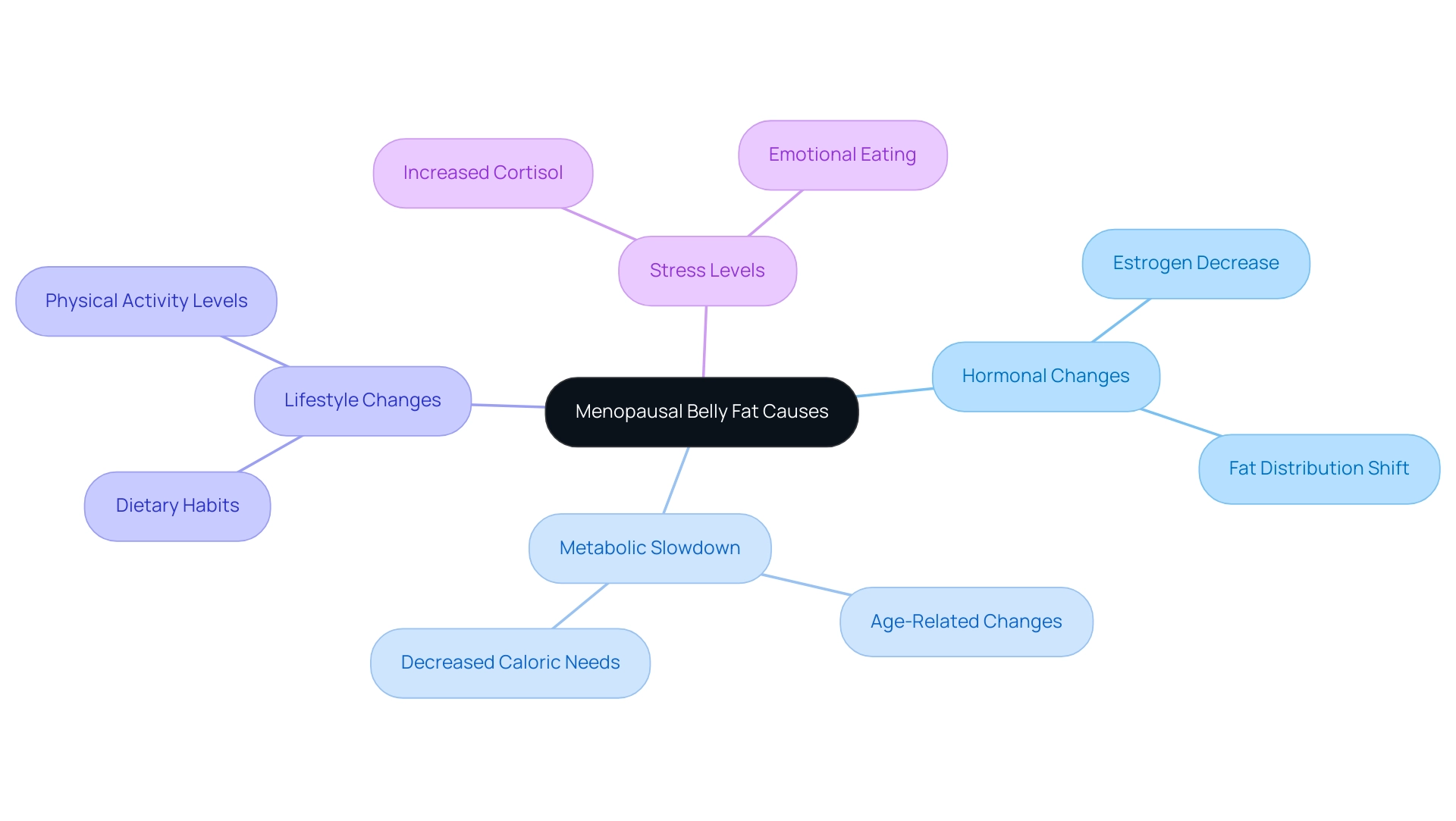
Effective Strategies to Overcome Menopausal Belly Fat
-
Adopt a Balanced Diet: Emphasizing the significance of whole foods, a nutrient-rich diet filled with fruits, vegetables, whole grains, and lean proteins is essential for effective weight management. Reducing processed foods and added sugars can lead to significant improvements in overall health. Recent studies indicate that adherence to a traditional Mediterranean diet can facilitate fat loss while preserving muscle mass, which is particularly beneficial for women dealing with menopot belly. At Foresight Health Coaching, our nutritional guidance is tailored to help individuals navigate these dietary changes effectively, including strategies specifically designed to alleviate abdominal distension.
-
Regular Physical Activity: It’s recommended to engage in at least 150 minutes of moderate aerobic activity or 75 minutes of vigorous activity weekly, complemented by strength training exercises. This combination is crucial for muscle preservation and metabolic enhancement. Fitness experts recommend that consistent physical activity not only aids in managing menopot belly but can also significantly reduce belly fat. Foresight offers personalized fitness coaching, including exercises that target core strength and digestive health, to ensure adherence to these recommendations, understanding that maintaining a routine can be challenging, as evidenced by a trial showing a 16% attrition rate at 12 months.
-
Manage Stress: Chronic stress can disrupt hormonal balance, contributing to weight gain. Integrating stress-reducing techniques such as yoga, meditation, or mindfulness practices can yield remarkable benefits. Rafi Alnjadat emphasizes that healthcare interventions should focus on both dietary control and physical activity to support women during this transformative life stage. Our wellness programs include workshops tailored to equip participants with stress management strategies, which can also help mitigate symptoms of abdominal distension.
-
Stay Hydrated: Sufficient hydration is essential for hunger control and general well-being. Aim for at least 8 glasses of water daily to aid in metabolic processes and promote well-being.
-
Prioritize Sleep: Quality sleep—targeting 7-9 hours per night—is crucial. Insufficient rest can disrupt the hormones that regulate appetite and weight, complicating efforts to manage menopot belly fat effectively. Our wellness coaching also addresses sleep hygiene to enhance your overall well-being, including its role in digestive wellness.
Regular Wellness Check-ups: Ongoing consultations with healthcare professionals can help monitor hormonal levels and overall well-being, ensuring a comprehensive strategy to address menopausal symptoms. Neff et al. (2016) highlight that postmenopausal individuals often experience a lower core body temperature, affecting energy metabolism, which underscores the importance of customized wellness strategies. Our coaching services ensure that you stay connected with professionals for regular check-ups and support.
Furthermore, the case study titled 'Challenges in Promoting Healthy Lifestyles' illustrates various factors influencing adherence to a balanced lifestyle, including socioeconomic status and education, emphasizing the need for comprehensive interventions to support menopausal women in making lasting dietary and lifestyle changes. By adopting these proactive strategies, individuals can effectively combat menopot belly fat while enhancing their overall well-being during this pivotal stage of life, supported by Foresight's tailored health coaching services and specialized workshops focused on digestive health.
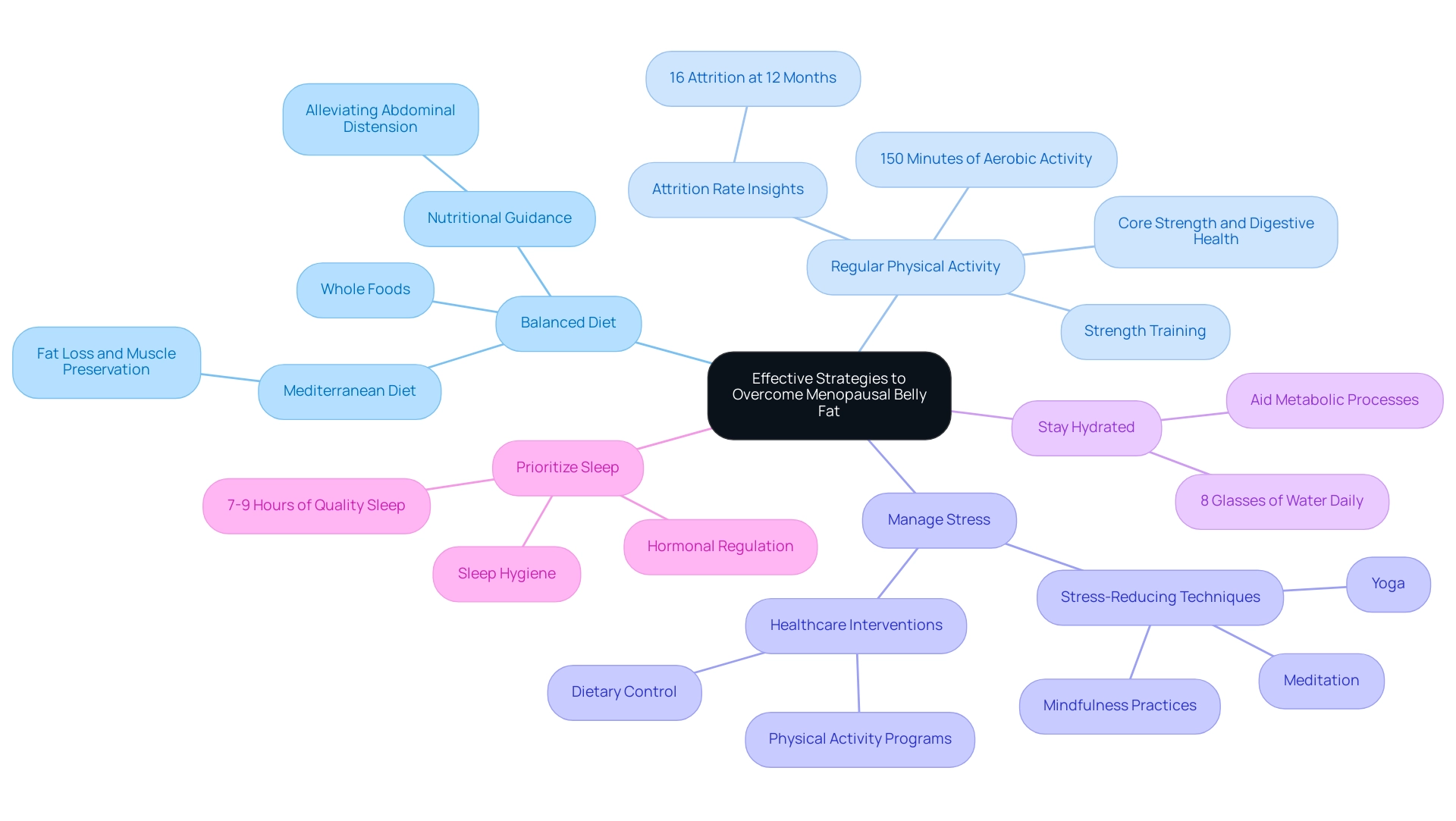
The Role of Hormones in Weight Management
The intricate interplay of hormones significantly influences body mass regulation, particularly during menopause. Fluctuations in estrogen, progesterone, and testosterone can dramatically impact metabolism, appetite, and fat distribution. Notably, decreased estrogen levels are associated with increased abdominal fat storage, contributing to a menopot belly, which is a concern for many individuals.
In a prospective study, it was revealed that the average increase among participants aged 42-50 was 2.2 kg, with 20% experiencing gains exceeding 4.5 kg. Weight changes varied significantly, ranging from a 14.8 kg loss to a 32.4 kg gain, underscoring the variability in experiences among individuals during this period. Dr. George Panotopoulos, an expert in Internal Medicine and Obesity, notes that 'The average weight gain was 2.2 + 4.1 kg during this period; 20% of individuals gained more than 4.5 kg, and only 3% lost more than 4.5 kg.'
Furthermore, estrogen deprivation during menopause is likely linked to an increased risk of coronary heart disease, highlighting the importance of managing these hormonal shifts. To effectively navigate these changes, women are encouraged to engage in regular exercise, maintain a nutritious diet, and consult healthcare professionals about hormone therapy options. Our wellness coaching app can be an invaluable resource in this journey, offering personalized workouts and nutrition guidance tailored to individual hormonal changes.
With daily programming features that assist users in staying on track with their objectives, direct messaging with coaches for personalized support, and a community for motivation, the app empowers individuals to take charge of their well-being. By understanding the hormonal landscape and its profound effects on weight management, individuals can curate a personalized approach to well-being that addresses issues such as menopot belly, fostering a supportive environment for others facing similar challenges.
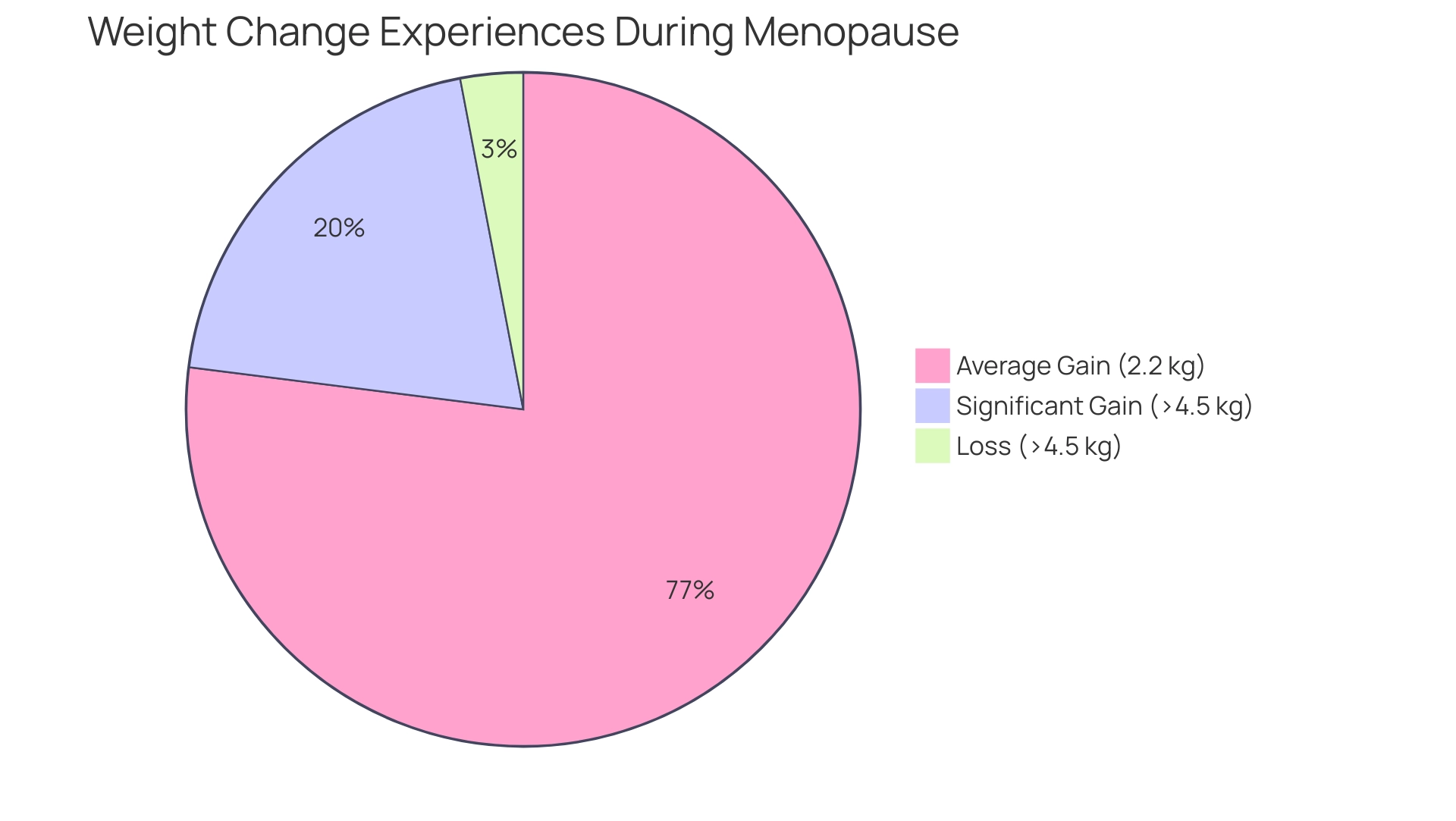
Incorporating Mindfulness and Mental Health Strategies
Incorporating mindfulness practices such as meditation and deep breathing exercises can profoundly impact stress reduction and emotional well-being, particularly for women undergoing this life transition. By engaging in personalized health coaching, individuals can feel proud and confident as they navigate this transitional phase. Stress is a significant factor that often leads to overeating and unhealthy food choices, exacerbating the development of a menopot belly during menopause.
Research shows that mindfulness training and dietary regimes can yield lasting benefits, with effectiveness enduring beyond two months. For instance, one of our clients reported a significant reduction in stress levels and improved eating habits after just a few weeks of personalized coaching. By embracing daily mindfulness techniques, women can cultivate a heightened awareness of their eating habits and the emotional triggers influencing them, empowering them to make healthier choices.
Additionally, fostering social support from friends, family, or support groups enhances resilience and provides encouragement, crucial for personal and family well-being. It's important to understand that the impact of mindfulness practices on weight and cardiovascular disease (CVD) risk is gradual, requiring extended follow-up to demonstrate significant changes. With the increasing popularity of yoga, meditation, and chiropractic use among U.S. adults, prioritizing mental wellness unlocks potential for holistic well-being, particularly in managing menopot belly during menopause.
Remember, the journey toward emotional balance and healthy living starts with each mindful moment. Let's discuss how we can help your team thrive by integrating these principles into their well-being journey. Reach out to us today to arrange a consultation and take the first step toward improved well-being.
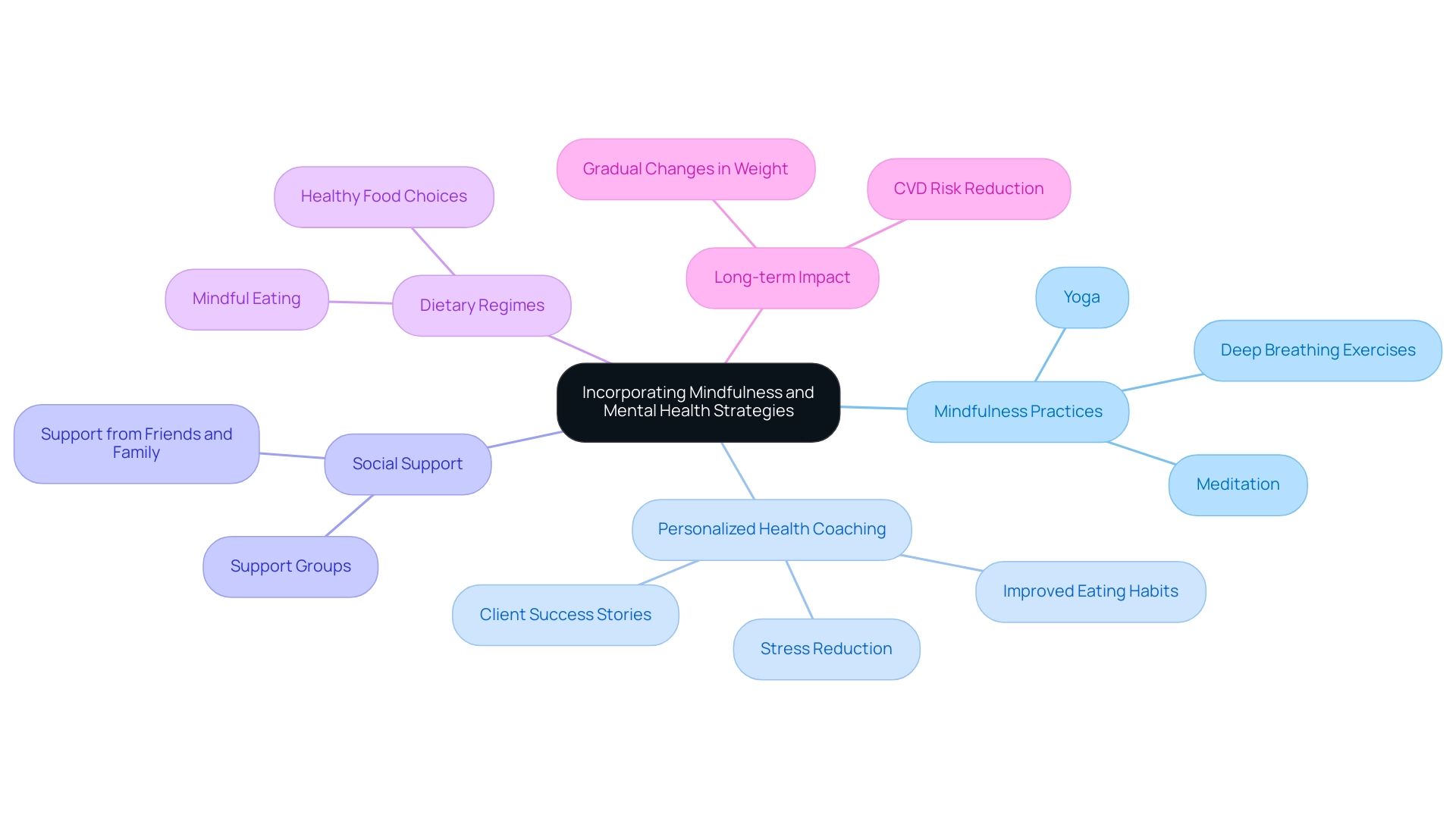
Building a Supportive Community for Health
Creating a community of supportive, like-minded individuals can significantly boost motivation and accountability during the menopot belly journey. Joining or forming a group focused on fitness or wellness enables members to share their experiences, challenges, and successes, fostering an atmosphere of encouragement and understanding. Engaging with others who are navigating similar transitions can instill a sense of belonging that is crucial for emotional well-being.
Research emphasizes that perceived social support has a beneficial impact on the experiences of transitional phases and serves as a significant predictor of favorable wellness outcomes. For instance, a qualitative study titled 'Desire for Personalized Care' revealed that while some women felt adequately informed, others lacked knowledge and desired personalized support, emphasizing the need for community engagement. Online forums, local meet-ups, and wellness programs at work serve as excellent platforms for cultivating this supportive environment.
As the WHO emphasizes, they are dedicated to increasing understanding of menopause and the impact of conditions such as menopot belly by advocating for accessible medical information and supportive networks, which is vital for promoting healthy aging and quality of life before, during, and after menopause. Remember, you are not alone in this journey; collective efforts can lead to meaningful enhancements in wellness and well-being. Embrace the power of community and take proactive steps to build connections that uplift and empower.
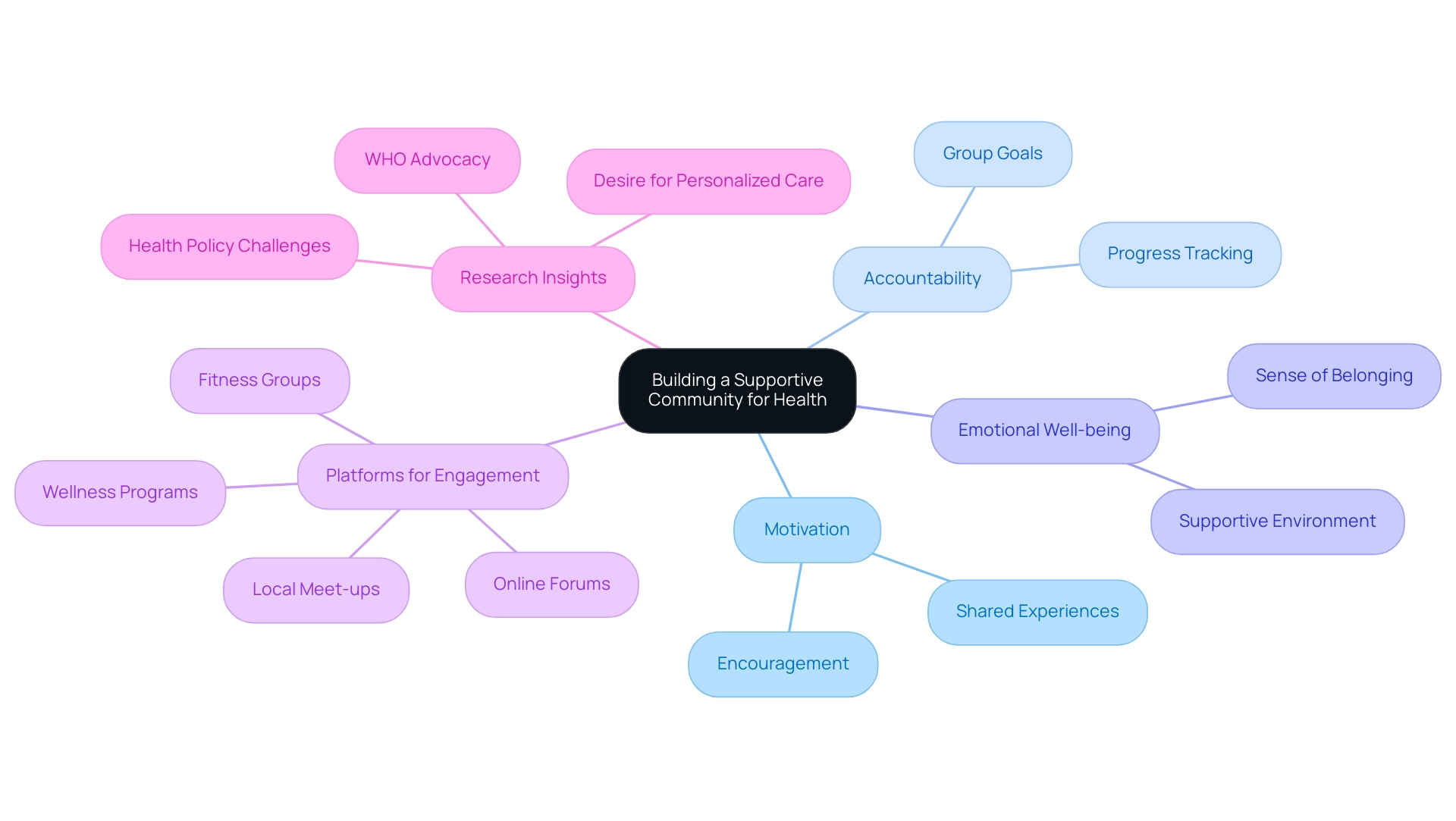
Consulting with Health Professionals
Engaging with healthcare professionals—such as dietitians, nutritionists, or endocrinologists—can significantly enhance the management of menopausal symptoms. These specialists provide customized guidance that aligns with personal well-being requirements, ensuring a personalized approach to dietary and lifestyle changes. Regular check-ups are essential, not only for managing menopausal symptoms but also for monitoring hormone levels and addressing the menopot belly, as well as identifying any underlying conditions that may influence weight.
Furthermore, the assistance of mental wellness experts can be invaluable in navigating the emotional challenges often encountered during this transition. The latest findings suggest that the annual direct medical expenses of menopausal symptoms can compete with those of other major medical conditions, highlighting the importance of consulting healthcare professionals to enhance wellness outcomes. For instance, dietitians can offer tailored nutrition plans that take into account the sociodemographic traits of women experiencing this life stage, such as age and educational background, which may affect dietary choices and wellness management.
As one patient shared, it took three years of persistence for their healthcare provider to prescribe hormone replacement therapy—highlighting the necessity of advocating for one’s wellbeing. Empowering yourself through informed consultations is not just beneficial; it's a crucial step toward better health during menopause.
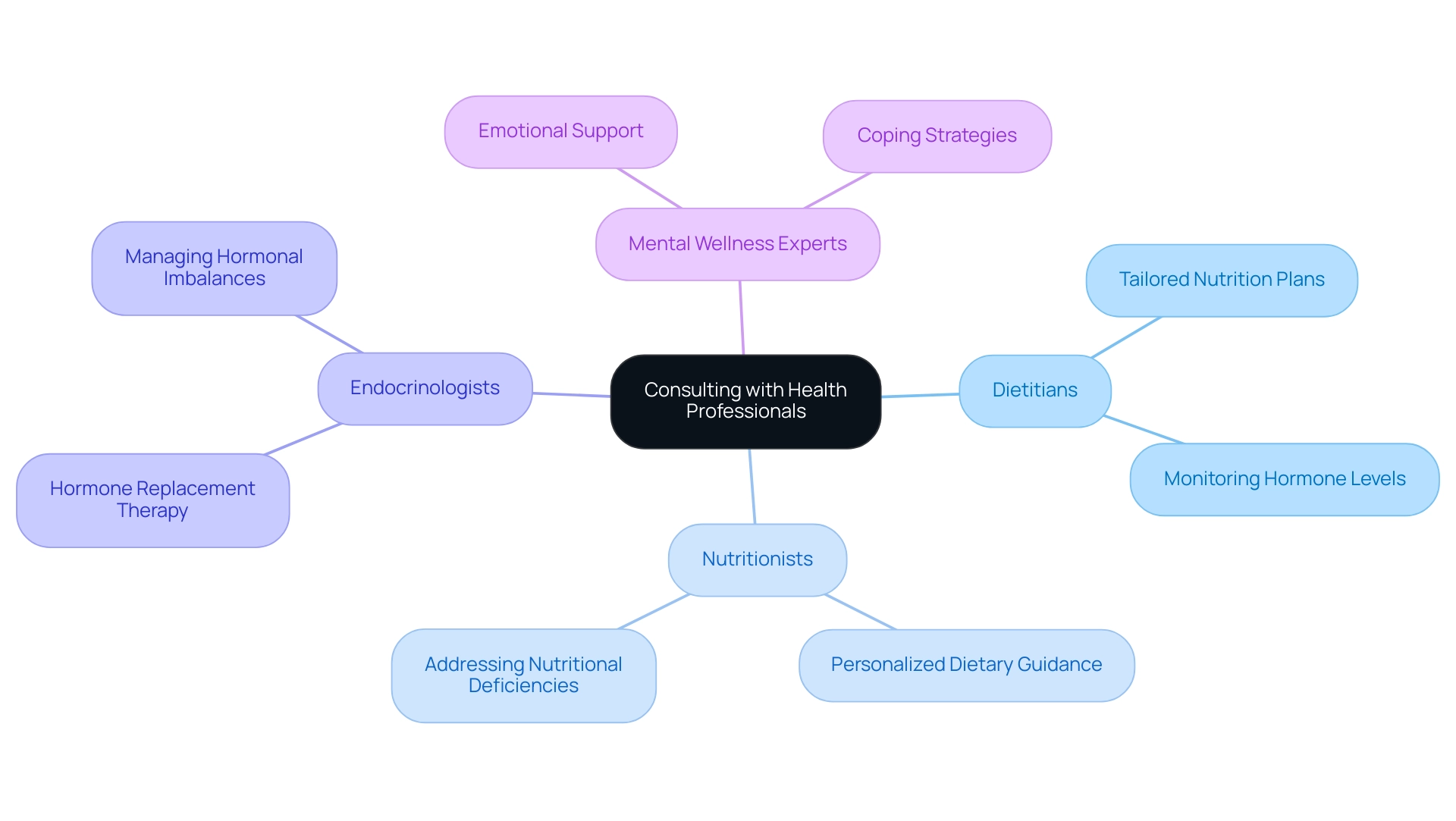
Conclusion
Understanding the complexities surrounding menopausal belly fat is vital for fostering a supportive workplace environment. Throughout this article, the intricate relationship between hormonal changes and weight gain has been explored, highlighting the significant impact these shifts have on women's health. From the effects of decreased estrogen levels to the importance of a balanced diet and regular physical activity, it is clear that proactive measures can help manage menopausal symptoms effectively.
Implementing strategies such as:
- Stress management
- Proper hydration
- Prioritizing sleep
can empower women to take charge of their health during this transformative phase. Moreover, the role of community support cannot be overstated; engaging with others facing similar challenges can enhance motivation and resilience. By cultivating a culture of well-being that encourages open discussions about menopause, HR Benefits Managers can play a pivotal role in supporting their teams.
Ultimately, the journey through menopause can be navigated successfully with the right tools and resources. By prioritizing health consultations and fostering an environment of support and understanding, organizations can help women reclaim their vitality and thrive during this significant life transition. Taking these steps not only benefits individual employees but also strengthens the overall health and productivity of the organization.




